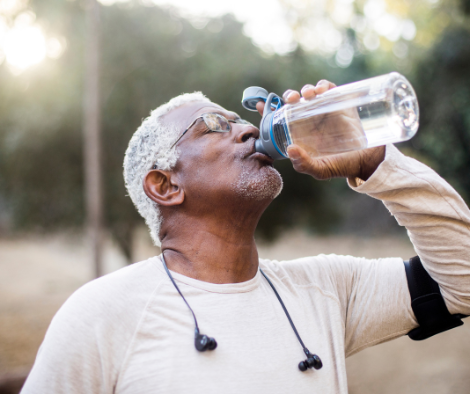The Importance of Staying Hydrated: Why Seniors Need to Drink Up!
Water does more than just quench thirst—it plays a critical role in keeping the body functioning properly. However, as people age, their sense of thirst decreases, making it easier to become dehydrated without even realizing it.
Lawrence Hobart
2/18/20252 min read


Welcome back to CareTec’s special series on senior health and wellness! Throughout this series, we’ve explored various topics that impact the physical, mental, and emotional well-being of seniors. CareTec is committed to leveraging AI technology to help monitor and improve senior health, offering caregivers the tools they need to provide the best possible support.
In our last blog, “Mindfulness for Seniors: Finding Calm in Everyday Moments,” we discussed how simple mindfulness practices can help seniors reduce stress, improve focus, and enhance emotional well-being. By incorporating small mindfulness techniques—like deep breathing and gratitude exercises—seniors can create a sense of calm in their daily routines.
Today, we’re shifting to a topic that might seem basic but is absolutely essential: hydration. Many seniors don’t realize how dehydration can sneak up on them, leading to serious health risks. So, let’s talk about why staying hydrated is crucial and how small changes can make a big difference in overall health.
The Importance of Staying Hydrated: Why Seniors Need to Drink Up!
Water does more than just quench thirst—it plays a critical role in keeping the body functioning properly. However, as people age, their sense of thirst decreases, making it easier to become dehydrated without even realizing it.
Why Hydration Matters for Seniors
Proper hydration is essential for seniors because it:
Supports cognitive function: Even mild dehydration can cause confusion, memory issues, and difficulty concentrating. Staying hydrated helps keep the mind sharp.
Aids digestion: Water helps prevent constipation and keeps the digestive system running smoothly, reducing discomfort and bloating.
Regulates body temperature: Seniors are more prone to overheating, especially in warm weather. Proper hydration helps the body stay cool and function properly.
Keeps joints and muscles healthy: Water helps lubricate joints and muscles, reducing stiffness and discomfort.
Prevents fatigue: Dehydration can lead to low energy levels and weakness, making daily activities feel more exhausting than they should.
How to Encourage Hydration
Getting enough fluids doesn’t have to be a chore! Here are some simple ways seniors can stay hydrated:
Make water more enjoyable: If plain water isn’t appealing, try adding slices of lemon, cucumber, or berries for a refreshing twist.
Eat water-rich foods: Fruits and vegetables like watermelon, cucumbers, oranges, and strawberries can contribute to daily hydration.
Use a hydration tracker: Apps or simple reminders on a phone or smart device can help seniors keep track of how much they’re drinking.
Drink consistently throughout the day: Encourage sipping small amounts of water regularly rather than waiting until feeling thirsty.
When to Be Concerned About Dehydration
While mild dehydration can often be fixed with an extra glass or two of water, caregivers should be mindful of these warning signs that could indicate a more serious issue:
Dark urine or infrequent urination: Urine should be light yellow—if it’s dark or there’s a noticeable decrease in bathroom visits, dehydration may be a concern.
Dizziness or confusion: Feeling lightheaded or having trouble concentrating can be an early sign of dehydration.
Dry skin and lips: If skin appears dry or lips are cracked, the body may be lacking fluids.
Fatigue or extreme thirst: Feeling unusually tired or overly thirsty can be a late sign of dehydration.
How Technology Can Help
AI-powered health monitoring tools can help caregivers track hydration levels by monitoring daily intake patterns and identifying early warning signs of dehydration. Smart water bottles and hydration reminders can also be useful tools for seniors to maintain good hydration habits.
Disclaimer:
This blog is intended for informational purposes only and should not replace professional medical advice, diagnosis, or treatment. If you or a loved one is experiencing symptoms of dehydration, seek medical advice from a healthcare professional.
©2025 CareTec.AI
Melbourne: 101 Collins St Melbourne VIC 3000 +613 9999 7379
Sydney: 2 Chifley Square, Sydney NSW 2000 +612 8880 0307
Queensland: 46 Cavill Ave, Surfers Paradise QLD 4217 +617 3667 7473
Texas: 200 W 6th St, Austin, TX 78701 +1 (737) 7101 776
London: 22 Bishopsgate, London EC2N 4AJ +44 (020) 4577 4024


